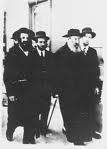The Power Of the Teacher in the Five Fold
 When Jesus was on earth, if you were Jewish, you would follow a rabbi, a teacher, who would instruct you on the teachings of the Torah and Talmud. You became a “follower” of him, thus the 12 “followed” this young rabbi named Jesus and became known as his “followers.” Jesus taught those who followed him about the kingdom of God. Parables were his most effective tool, for some understood them, others were baffled. What gave some understanding and others frustration?
When Jesus was on earth, if you were Jewish, you would follow a rabbi, a teacher, who would instruct you on the teachings of the Torah and Talmud. You became a “follower” of him, thus the 12 “followed” this young rabbi named Jesus and became known as his “followers.” Jesus taught those who followed him about the kingdom of God. Parables were his most effective tool, for some understood them, others were baffled. What gave some understanding and others frustration?
Once Jesus asked them, “Who do you say that I am?” Only Peter got the correct answer, the Messiah. Then Jesus tells him that “flesh and blood” did not reveal this, but the “Spirit” did. Most of Jesus’ teachings were misunderstood while he was alive. His disciples argued over who would be the greatest in this kingdom, looking for a political Messiah. Only after seeing their Messiah die for them on the Cross and miraculously raise from the dead, ascending into heaven, and receiving the gift of the Holy Spirit at Pentecost did they finally “understand” Jesus’ teaching, because Jesus had told them that unless he goes back to the Father, the Holy Spirit can not be released, but when released, he will teach them all things. The key to teaching in the Five Fold is allowing the Holy Spirit to do it, and the physical teacher is just a vessel in the process.
I Corinthians 2:10-16 fills us in about the role of the Holy Spirit as a teacher: “…..but God has revealed it to us by the Spirit. The Spirit searches all things, even the deep things of God. For who among men knows the thoughts of a man except the man’s spirit within him? In the same way no one knows the thoughts of God except the Spirit of God. We have not received the spirit of the world, but the Spirit who is from God, that we may understand what God has freely given us. This is what we speak, not in words taught us by human wisdom but in words taught by the Spirit, expressing spiritual truths in spiritual words. The man without the Spirit does not accept the things that come from the Spirit of God, for they are foolishness to him, and he cannot understand them, because they are spiritually discerned. The spiritual man makes judgments about all things, but he himself is not subject to any man’s judgment: ‘For who has known the mind of the Lord that he may instruct him?’ But we have the mind of Christ.”
 On my way to earning a Masters Degree in Biblical Studies, I had to take “theology” courses, which comprised of studying what Biblical scholars had studied and debated over the centuries. Often the content was hard to understand, complex in speech and word, based on quoting one “scholar” against another over supposedly Christian principles and doctrines. Often I would have to read a paragraph several times before understanding its meaning. You have to be an “academic scholar” to understand it, that is why it is a “graduate” course. On the other hand when I received the Baptism in the Holy Spirit, my first reaction was to read through the Bible allowing the Holy Spirit to teach me. I saw the threads of truth about Jesus, salvation, the Holy Spirit, the revelation of the Father, and more throughout all sixty-six books. I highlighted them in different colors as truth continued to be unveiled to me through the Holy Spirit. This learning had simplicity to it, not the complexity of what later became theology. This learning brought life to my daily living, not isolation in Academiaville. This type of learning challenged me to “walk out” my faith journey in my daily living with my actual neighbors and friends, not seclude myself in bookwork. Passages that once were only theological in nature, often misunderstood by me, now became revelations that brought understanding and life.
On my way to earning a Masters Degree in Biblical Studies, I had to take “theology” courses, which comprised of studying what Biblical scholars had studied and debated over the centuries. Often the content was hard to understand, complex in speech and word, based on quoting one “scholar” against another over supposedly Christian principles and doctrines. Often I would have to read a paragraph several times before understanding its meaning. You have to be an “academic scholar” to understand it, that is why it is a “graduate” course. On the other hand when I received the Baptism in the Holy Spirit, my first reaction was to read through the Bible allowing the Holy Spirit to teach me. I saw the threads of truth about Jesus, salvation, the Holy Spirit, the revelation of the Father, and more throughout all sixty-six books. I highlighted them in different colors as truth continued to be unveiled to me through the Holy Spirit. This learning had simplicity to it, not the complexity of what later became theology. This learning brought life to my daily living, not isolation in Academiaville. This type of learning challenged me to “walk out” my faith journey in my daily living with my actual neighbors and friends, not seclude myself in bookwork. Passages that once were only theological in nature, often misunderstood by me, now became revelations that brought understanding and life.
After forty years of teaching, a Bachelor’s Degree, two Master’s Degrees, and thirty additional graduate course credits, I have come to realize that it wasn’t necessarily all those degrees that made me the teacher I am, though they had some merit, but the “passion” that was in me. Did it take me almost four academic degrees to “understand” grammar, literature, poetry, and the writing process that made a difference in how I reached my students, or was it the “passion” with in me, that love for language that developed in me, the yearning to write and grammatically write well that touched my students?
I contend the “power” of “effectiveness” of “teaching” came “from within”! Student’s responded to me when they saw how I “valued” what I taught. Just teaching the subject for the subject’s sake became lifeless, meaningless, of little value, but teaching my passion spilled over to become the passion of my students. Because I love to write, my passion for writing soon became “effective” as my students became willing to not only let ideas flow from their pens, but were now willing to spend endless hours laboriously editing their work to produce a composition, an essay that would be well written, a piece to be proud of, a treasure to be honored and shared. “Passion” released brings “Productivity”.
The Church needs to “release” the “spirit of teaching” among its “saints” again, so that the passion from within them will spill out, overflow, to others. Although the content is important, the passion that drives teaching that content is what is “effective”. Students remember teachers who “inspired” them as well as the content they taught. The Church needs to “release” the Holy Spirit to again be its teacher creating many “Road to Emmaus” for its believers, again revealing the truths it has dug deep to find, understand, and teach, again “releasing” those truths with understanding spiritually and in their practical lives, and again establishing apostolic teaching to bring unity in the body of Christ. Holy Spirit be my teacher, be my passion! I release you to teach me and the Church as a whole.